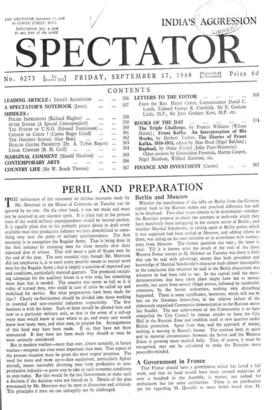Berlin and Moscow
Whether the transference of the talks on Berlin from the German capital back to the Russian makes any practical difference has still to be disclosed. Two clear issues remain to be determined—whether the Russians propose to check the attempts at mob-rule which they have manifestly been instigating in the eastern sector of Berlin ; and whether Marshal Sokolovsky, in raising again at Berlin points which it was supposed had been settled at Moscow, and adding others to them, was acting on his own initiative or in accordance with instruc- tions from Moscow. The former question can wait ; the latter is vital. Till it is known what the result of the visit of the three Western Power envoys to M. Molotov on Tuesday was there is little that can be said with advantage, except that both precedent and knowledge of Marshal Sokolovsky's character leads almost inescapably to the conclusion that whatever he said in the Berlin discussions was whatever he had been told to say. In the capital itself the mass- demonstrations that have taken place might have led to serious trouble, but apart from several illegal arrests, followed by intolerable sentences, by the Soviet authorities, nothing very disturbing happened. There is some significance, moreover, which will not be lost on the Germans themselves, in the relative failure of the elaborately organised Communist demonstration in the Russian sector last Sunday. The one achievement of the Communists is to have compelled the City Council by riotous attacks to leave the City Hall in the Russian Zone and establish itself in new quarters under British protection. Apart from that, and the approach of winter, nothing is moving in Russia's favour. The contrast both in spirit and in material circumstances between the Soviet and the Western Zones is growing more marked daily. That, of course, it must be recognised, may not be calculated to make the Russians more peaceably-minded.


































